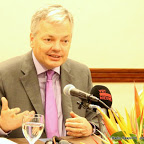“We need all countries, all the 11, to participate positively to the implementation of the Addis-Abeba Agreement [Framework for Peace, Securiy and Development]. And, let us be clear, we need to see Ugandan and Rwandan governments’ willingness to participate to the solution, and not to be part of the problem,” Belgian Foreign Affairs Minister Didier Reynders told journalists on August 13, 2013 at the end of his three-day visit to the Democratic Republic of the Congo (DRC).
During his three-day visit that focused on the security in Eastern DRC and saw him launch high visibility projects in which the Belgian government has invested, he met Congolese President Joseph Kabila, the Prime Minister Augustine Matata Ponyo and the Minister of Foreign Affairs and Cooperation, Raymond Tshibanda.
The Congolese Government Has done Its Part
Didier Reynders insisted that the Congolese government has done its part and that, now it is up to the International Community to do its own, by cracking down on Rwandan backed M23 Congolese rebels:
“I think the Congolese government went beyond what is possible. (…) Nobody should ask the Congolese, and I also hope the Congolese refuse to listen to anyone who dares to ask, to reintegrate within the army [FARDC] people who rebelled, not once, or twice, or three times. This would be encouraging indiscipline by reintegrating unruly individuals.“
Didier Reynders: the nemesis of the Rwandan Dictator General Paul Kagame
It is not the first time Didier Reynders has singled out the Rwandan government and called on it to engage on a path of peace in the Great Lakes Region. In early July 2013, he said, while implicitly referring to the proposition by the Tanzanian President Jakaya Kikwete, reinforced by Southern African Development Community (SADC) recommendation to the Rwandan dictator General Paul Kagame, to open negotiations with his armed opposition in order to bring peace in Eastern Democratic Republic of the Congo (DRC), Rwanda and the Great Region of Africa, that: “It is clear that dialogue with all the forces that are often referred to as negative if they do not take up arms, if they agree to talk (…), it is primarily a national priority, and then in the strategic interest of the Great Lakes region.“
Last year, in September 2012, the Belgian Foreign Affairs Minister expressed his disdain for the Rwandan dictator General Paul Kagame (See our article, New York: DRC Joseph Kabila Shines; Rwandan Paul Kagame’s Star Wanes of September 30, 2012) during a roundtable organized in New York, by the UN Secretary General Ban Ki-Moon on the situation on the Democratic Republic of the Congo (DRC), following accusations against the Rwandan government supported M23 rebels of playing havoc, raping women, mass murdering civilians, and looting (see our article here).
“I think in terms of impunity and reintegration, I think there are limits, a red line not to be crossed-. We can argue on the margins – but I feel that the Congolese Government had done the maximum, ” he said, before expressing his concern regarding the success of the effort by the International Community.
Patience has its limits: Belgian Foreign Affairs Minister Tells The International Community
“We need to be patient, but the Congolese people have very, vey high expectations . At some point, if no positive change is observed on the ground , the International Community will lose its credibility.”
His prediction may be close to reality. In fact, months after the appointment of the UN Special Envoy Mary Robinson, the US Envoy Russ Feingold, and the decision to deploy the UN Intervention Brigade, nothing much has evolved on the ground.
UN Envoy Mary Robinson has yet to disclose an actionable roadmap or, even, a strategic framework of the political solutions she has been promoting and the UN Intervention Brigade has yet to start flexing its muscles.
So far, the only concrete solution has been proposed by the Tanzanian President Jakaya Kikwete (see our article Relations Between Rwanda and Tanzania Have Soured, President Jakaya Kikwete Says).
Meanwhile, the people in Eastern DRC continues on their journey of suffering .
©2013 AfroAmerica Network. All Rights Reserved.





Comments on this entry are closed.